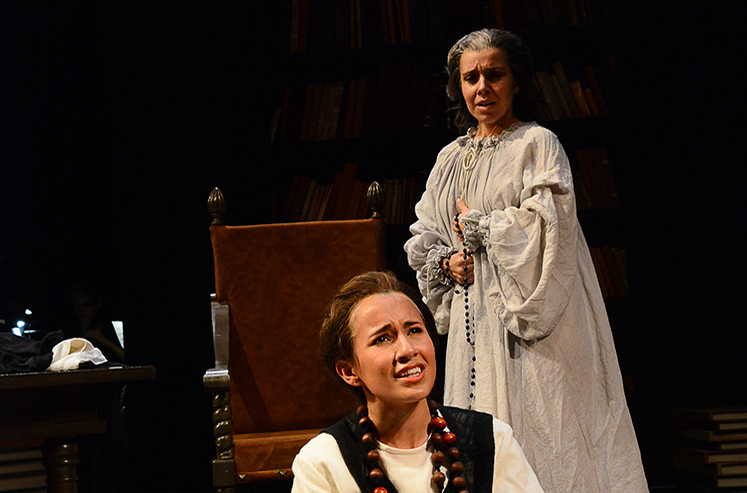Daniel Crozier’s chamber opera, With Blood, With Ink, lived up to all the passion implied by that title in its premiere on Sunday afternoon, as part of the Fort Worth Opera’s annual festival.
Although the performance space at McDavid Studio is small compared to the main stage at Bass Performance Hall, the ideas and concepts contained in With Blood, With Ink are monumental, and entirely well-suited to the chamber opera genre.
A late-17th-century Mexican nun named Sor Juana Inés de la Cruz provided the inspiration for the work. She is proclaimed as both a fountainhead of Mexican literature and for creating one of the most significant bodies of poetry in the Western Hemisphere, before Whitman and Dickinson.
She also lived a life that fascinates both on and off the stage, including an early struggle to get ahead in a world that found the education of women unnecessary and immoral. The publication of her poetry during her lifetime provoked censure from church officials in Mexico City. Sor Juana eventually renounced her intellectual and creative activities, actually writing a statement of repentance in her own blood, shortly before her death at 43. The year was 1695, and interestingly, the events were concurrent with the New England witchcraft trials.
Together with librettist Peter M. Krask, composer Crozier built a one-act, 90-minute drama that explores the tyranny of paternalist hierarchy and the still relevant issue of political fundamentalism versus intellectual rationalism. Although they completed the work in 1993 while students at Peabody Conservatory, the ideas and the music are even more timely in 2014.
On her deathbed, Sor Juana (soprano Sandra Lopez) recalls her life, which is enacted by the younger version of herself (soprano and TCU alum, Vanessa Becerra, in her Fort Worth Opera debut). Krask and Crozier quite reasonably—based on references in Sor Juana’s poetry—introduce the possibility of a romantic link between Sor Juana and her real-life aristocratic patroness, Maria Luisa. That would be the wife of the viceroy of New Spain, and the role is imbued with appropriately noble attitude by mezzo-soprano Audrey Babcock. Tenor Ian McEuen takes on the role of Sor Juana’s confessor, Padre Antonio Núñez, who is portrayed here as disturbingly auto-masochistic. This in turn plays against the even more disturbing presentation of Sor Juana’s powerful nemesis, the Archbishop (baritone Jesse Enderle).
Crozier’s score is now two over decades old, and is hitherto unperformed in its complete version by a professional company. That’s a shame, as the material is unfailingly lyrical and inventive. It’s a sturdy, gently polytonal style, and the necessarily lean orchestration is unfailingly colorful and engaging throughout. Krask’s libretto likewise offers some arresting verbal moments. In one such example, Sor Juana’s illegitimate birth becomes the anti-paternalistic trope, “I have no father.”
Although the main body of the opera is a vision from Sor Juana’s deathbed, a dream-within-the-dream presents a moving ballet sequence for young girls in white communion dresses, boldly reminiscent of Balanchine’s Serenade. The only stutter in the otherwise flawless and imaginative libretto was the over-long exposition, near the beginning of the opera, concerning Sor Juana’s early life. Structurally, the entire work is beautifully interwoven with chants from the Roman Catholic mass for the dead, hauntingly set against Crozier’s contemporary orchestral accompaniment.
Timothy Myers masterfully conducted the small orchestra, which was cleverly integrated into the flat, stage-less space of McDavid Studio. Erhard Rom’s monasterial sets are imposing, and come complete with a giant crucifix. While Austin Scarlett’s costumes are gorgeous, their massiveness aptly suggests a sense of the Baroque-era social imprisonment from which the characters suffer. Director Dona D. Vaughn successfully maneuvered the challenges of a period piece in which two versions of the same character—the dying Sor Juana and the young Sor Juana—are onstage together virtually throughout the entire opera.
It’s an often-bleak story, one that doesn’t leave the viewer feeling exactly hopeful, but it’s still rich with lovely and thrilling moments. In that contrast exists the sweep of a life which, albeit tragic in its conclusion, was ultimately well-lived.





